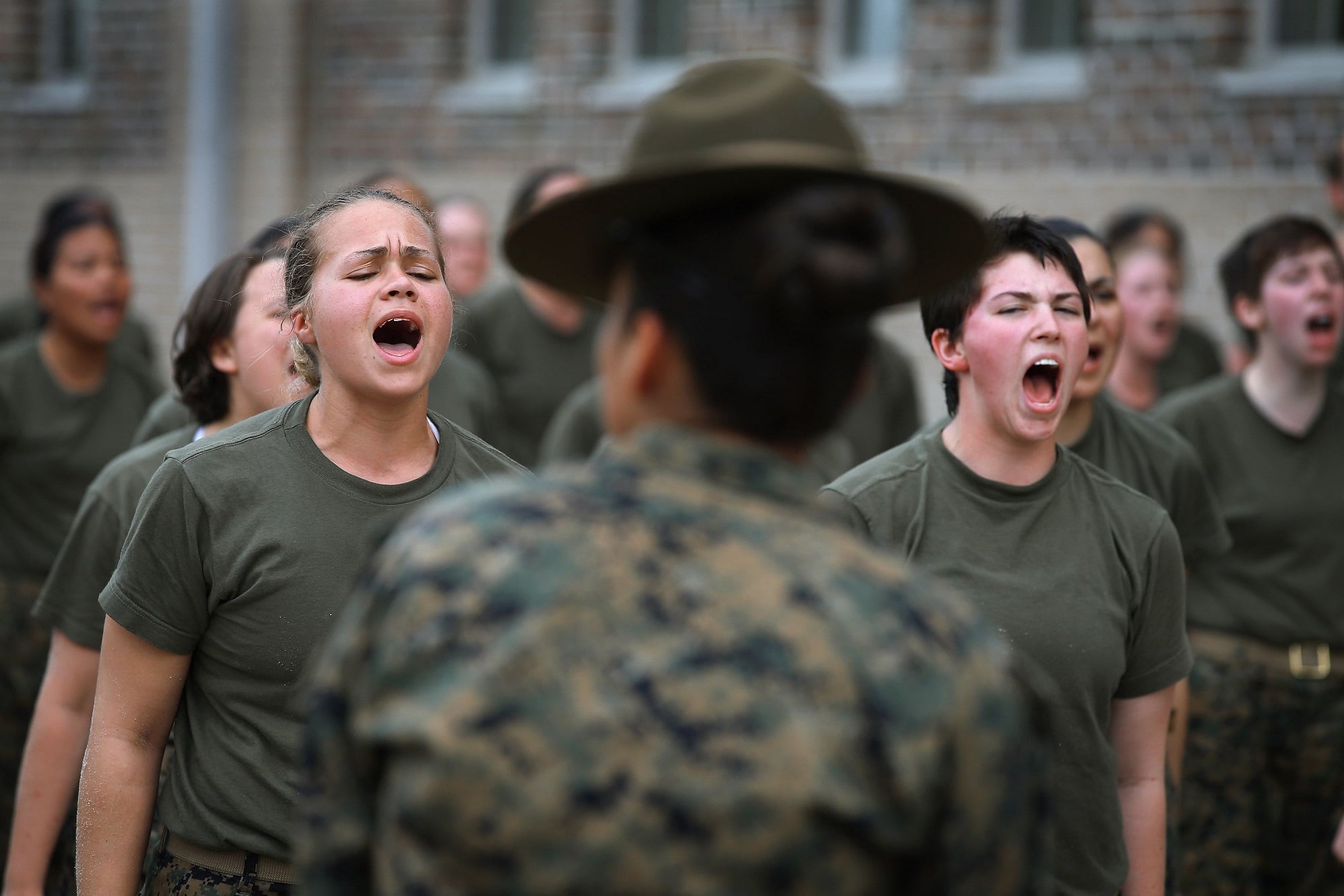Very few female Marine recruits are signing up for previously all-male ground combat jobs — and even fewer are passing the gender-neutral physical tests required for those jobs, according to recent data from Training and Education Command.
So far this year, women account for less than 1 percent of Marine recruits who are showing up to boot camp with contracts to train for combat arms career fields, jobs that were restricted to men until the Pentagon changed policy in January 2016.
For the dozens of women who have tried for a spot in the combat arms, most of them are failing to pass the initial test. As a result, those women are forced to transfer into non-combat jobs.
Between Oct. 1 and May 31, 51 female recruits entered boot camp with combat arms classifications, but only 13 of them — or 25 percent — met the physical requirements for those jobs, a test known as the MOS Classification Standard, according to the data, obtained by Marine Corps Times through a Freedom of Information Act request.
Meanwhile, among men who showed up to boot camp with similar contracts to train for combat jobs, the pass rate was about 96 percent. Marine Corps data shows that 7,264 of 7,552 of male recruits who attempted the same physical standards passed.
Of the 38 female recruits who failed the job-specific physical tests in boot camp:
- 17 failed the physical standards for combat support MOSs
- 12 failed the standards for infantry MOSs
- six failed for combat engineer MOSs
- three failed for fire direction and control
The pass-fail rates so far this year is similar to what the Marine Corps reported for last year. For fiscal 2016, a total of six out of 24 female recruits — also 25 percent — passed MOS Classification Standard for ground combat jobs, compared with 4,577 of 4,754 male recruits — a 96 percent pass rate for men, the data show.
For women who make the cut at boot camp, the success rate improves significantly when they arrive at their MOS schoolhouses and face another set of gender-neutral physical standards. The second round of tests, known as the MOS Specific Physical Standards, or MSPS, vary by job and passing them is required for graduation from the MOS school houses.
So far this year, about 90 percent female recruits who make it to combat-arms schoolhouse are passing those tests. Of the 21 women who attempted to meet these standards to join ground combat jobs between Oct. 1 and May 31, 19 passed, the data show. Two female Marines failed and were reclassified: One who tested as a combat engineer and the other as a tanker.
During that same time, 8,327 of 8,383 male Marines passed the MOS Specific Physical Standards for previously restricted MOSs, a success rate of 99 percent, according to the data. For fiscal 2016, 55 of 64 female Marines passed the physical standards at MOS schoolhouses for those MOSs, compared with 9,981 of 10,012 male Marines.
The gender-neutral standards at boot camp and MOS schoolhouses are designed to “give a reasonable assurance” that Marines are physically fit enough to do the jobs for which they are training, said Brian McGuire, deputy director of the Marine Corps’ Force Fitness Division.
McGuire noted that both men and women have been unable to meet the gender-neutral physical standards since they were implemented. Furthermore, the data show that recruits who pass the MOS Classification Standard are likely to pass the MOS Specific Physical Standards, he said.
But the data also show that Marine Corps Recruiting Command needs to do a better job letting women know that they can serve in ground combat MOSs and making sure that female poolees are physically fit by the time they arrive at boot camp, said retired Lt. Col. Kate Germano, who was in charge of training female recruits at Marine Corps Recruit Depot Parris Island, South Carolina.
“The first thing the Marine Corps should do is make sure that their female screening and accountability is the same as the male applicants in the delayed entry program,” Germano told Marine Corps Times.
Germano was relieved as commander of the 4th Recruit Training Battalion in June 2015 after a command climate survey and subsequent reviews painted her as a toxic leader, but she claims her commanding officer undermined her for holding female recruits to tougher physical standards.
During her two recruiting tours, Germano noticed that male recruiters were reluctant to devote much attention to female poolees out of a fear that they would be accused of having an inappropriate relationship with the women and that they were spending more time with them than male poolees, she said.
“Until the Marine Corps truly holds recruiters accountable for selling women on these new jobs and basically saying, ‘Hey, look: I recognize this glimmer of potential in you and I know you have what it takes and I’m going to help you get there,’ we’re going to continue to see these dismal numbers, and it’s exactly what the Marine Corps wants, because they don’t really want women in these fields anyway,” Germano said.
Both male and female poolees who want to train for ground combat jobs must pass an initial strength test before shipping to boot camp, said Lt. Col. John Caldwell, a spokesman for Marine Corps Recruiting Command.
“Marine recruiters tirelessly endeavor to find morally, mentally and physically qualified young men and women who are willing to try and serve their nation as Marines,” Caldwell said. “Poolees awaiting shipment are provided ample training resource materials to help prepare themselves for the rigors of recruit training. They are also provided and expected to participate in regular physical training opportunities with their recruiters and fellow poolees.”





